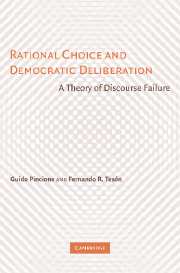Book contents
- Frontmatter
- Contents
- Preface
- Acknowledgments
- 1 Introduction
- 2 The Epistemic Argument for Deliberation
- 3 The Rational Choice Framework
- 4 The Resilience of Discourse Failure
- 5 Symbolism in Political Argument
- 6 Discourse Failure and Political Morality
- 7 Non-Epistemic Defenses of Deliberation
- 8 Deliberation, Consent, and Majority Rule
- 9 Overcoming Discourse Failure: Voluntary Communities
- Index
9 - Overcoming Discourse Failure: Voluntary Communities
Published online by Cambridge University Press: 05 May 2010
- Frontmatter
- Contents
- Preface
- Acknowledgments
- 1 Introduction
- 2 The Epistemic Argument for Deliberation
- 3 The Rational Choice Framework
- 4 The Resilience of Discourse Failure
- 5 Symbolism in Political Argument
- 6 Discourse Failure and Political Morality
- 7 Non-Epistemic Defenses of Deliberation
- 8 Deliberation, Consent, and Majority Rule
- 9 Overcoming Discourse Failure: Voluntary Communities
- Index
Summary
A Contractarian Society
In this chapter we tentatively suggest a remedy for the discursive pathologies that afflict typical liberal democracies. Throughout this book we have examined and rejected many attempts to cope with discourse failure that took for granted majority rule and wide governmental redistributive powers. The shortcomings of those proposals suggest that discourse failure cannot be eliminated short of a radical redesign of political institutions. We saw in Chapter 2 that discourse failure is the result of the combination of three factors: rational ignorance, posturing, and redistributive politics. Because, as we extensively argued, the first two factors cannot be eradicated under redistributive politics, getting rid of redistributive politics suggests itself as the only way out of discourse failure.
In this chapter we offer a proposal in that direction. We defend a contractarian society – that is, a society in which people allocate resources through voluntary exchanges, not through majority rule. We will call this society the Framework Contractarian Society (FCS). We remain neutral with respect to initial allocations of rights and duties. (Right-) libertarians, for example, uphold strong rights of self-ownership – that is, rights of exclusive control over one's own body and mental powers – and regard external resources as unowned and subject to appropriation, provided that, roughly put, others are not thereby made worse off. Alternatively, (left-) libertarians hold that external resources are initially owned in common and so allow private appropriation on the condition that the others be compensated.
- Type
- Chapter
- Information
- Rational Choice and Democratic DeliberationA Theory of Discourse Failure, pp. 228 - 248Publisher: Cambridge University PressPrint publication year: 2006
- 1
- Cited by



